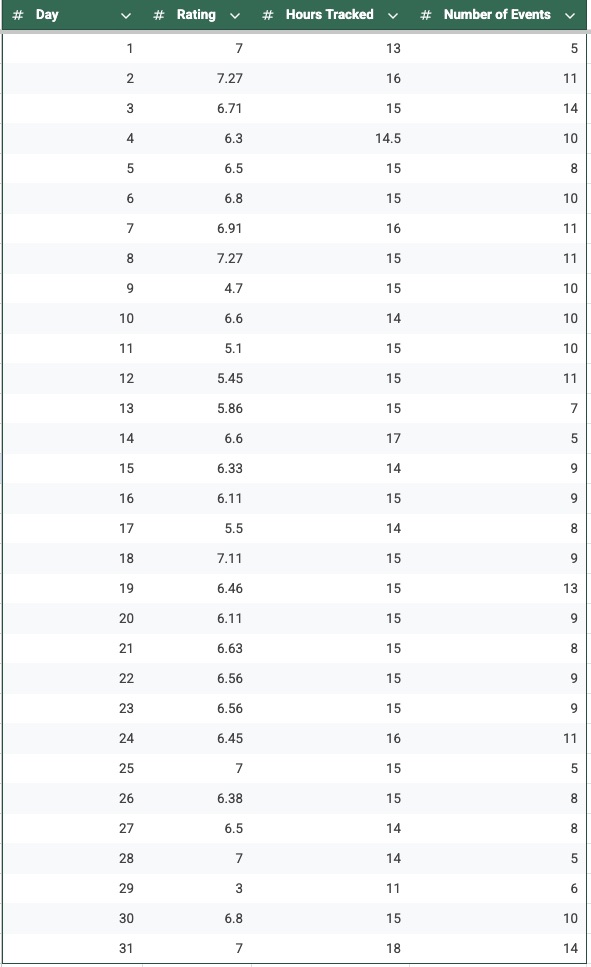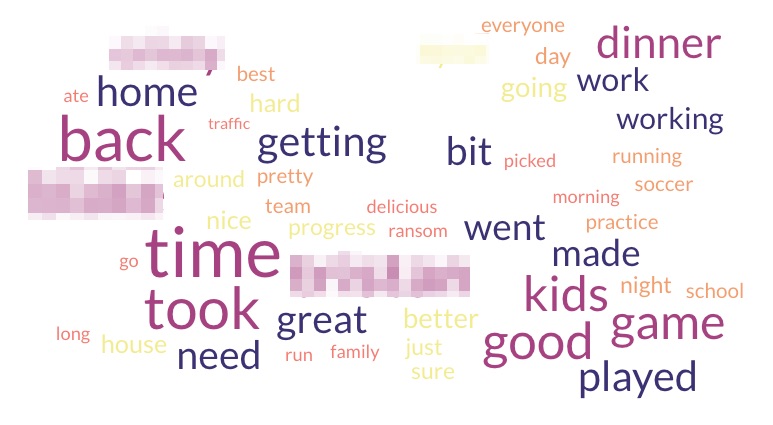What I Learned Tracking Every Minute of the Day for a Month

Over the month of December I tracked how I spent each and every minute of the day. You can dive into why I started the challenge as well as the daily updates here.
If you want to skip ahead, below are some links to help you jump around.
- What Went Well
- What Went Less Well
- The Cold Hard Data
- Where Do I Go From Here?
- Why You Should Join Me
How I Got Here
I kicked off this month of tracking every minute after I started reviewing my 2024. It was an objectively great year in terms of family life, but my professional life was meh at best. I am not saying I sat around and did nothing, I performed well at work, but I didn’t really push myself or accomplish many of the goals I set for myself at the beginning of the year.
I started looking back for where things went wrong. I am a hard worker. I honestly enjoy working. But I didn’t see the specific outcomes that I wanted. What gives?
As a husband and father of 3, I have all kinds of different responsibilities. It often feels like I am running in 100 different directions, because often, I am. All of these different demands on my time fragments my day into smaller chunks.
What ends up happening is that I start working on whatever shows up in front of me. So technically I am effective, but am I working on the right things?
Turns out, I am not working on the right things. At least, if I want to hit my goals. There will always be a certain amount of busy work required, but it shouldn’t be 100% busy work.
Similar to tracking calories when dieting, I figured tracking minutes would be a helpful practice. If you’ve unsuccessfully dieted in the past I beg you to start tracking calories the next time you try. We have no idea how many calories we are eating. It’s wild.
Let me warn you, it is not easy. Measuring your food, logging every meal, it’s tedious. But you learn so much about how much you are eating that it is worth the annoyance.
We love to make things more complicated than they have to be. Weight gain and weight loss are a pretty simple formula. If calories consumed are higher than calories burned, you gain weight, if calories in are lower than calories burned you lose weight.
For time management, we all have around 16 hours (24 – 8 hours of sleep) a day that we are awake. Assume an 8 hour traditional work day, that’s 8 hours of time for other stuff.
On December 1, I set the goal of tracking every minute of each day. I wanted to get a better understanding of how I was spending my time. Where are these 16 hours going?
It’s possible that my goals are not achievable because I simply do not have the time to make them happen. It’s also possible that I am making poor use of the time that I do have and need to “make the time” to achieve my goals.
Either way I started the month with genuine curiosity. Looking to better understand how I was spending my time and if it lined up with how I thought I was spending my time.
What Went Well
My single greatest takeaway from the month of tracking every minute is that I need to plan my days in advance.
Waking up without a plan for the day is a sure fire way to add indecision and optionality where it isn’t needed. As an entrepreneur you have the so-called freedom to choose what you are going to work on at any given time.
The paradox of choice is enough to paralyze the most productive amongst us. Thus the freedom to choose what you can work on, often comes back to haunt us.
Instead of working on the most important things, we work on the most urgent things. The urgent things find their way to you, the important things you often have to focus on.
Initially, it was hard to plan out tomorrow. What’s funny is that most of us have no problem letting other people and mostly semi-strangers block out time in our calendars, but the thought of blocking our own time out feels silly. I got over this silliness quickly when I noticed the relief I felt having a general plan for the day.
In my daily updates, I wrote that my daily plan was written in pencil not in pen. Things change throughout the day obviously, if I need to pick up a sick kid, or have a more pressing matter pop up, I change course.
Looking at the calendar and knowing what you are going to work on next is a huge relief.

Again, is it silly that past you is telling current you what to do? Maybe. Who cares. I want to get stuff done.
Reducing the amount of options you have in front of you dramatically increases the probability that you get something done.
I don’t think planning the day in advance is only helpful for entrepreneurs. By planning your day in advance you are essentially “making time.” It’s a small trick with huge potential benefits.
I challenge you to schedule whatever it is you continually tell yourself you don’t have enough time to do in your calendar.
Schedule your exercise, reading, writing or meditating the night before. Watch what happens.
Another takeaway was the don’t skip twice rule. Mistakes and slip ups are going to happen. We are all human. We need to plan for making mistakes and then finding ourselves back from the mistakes we make.
One skip is ok, two skips is not.
In my case, if I had a bad or unproductive day, I knew that I had to get back on track the next day. This prevents a complete spiral out of control.
Instead of saying I’ll get back to blocking my schedule next Monday, you start saying I’ll block out tomorrow, even if today was a disaster.
When tracking each and every minute of the day you also notice things that might usually slip by. For example, I like cooking and baking in my spare time. Part distraction, part stress reliever, all delicious.
I noticed that baking or trying new recipes in the kitchen brought me a lot of joy. The awareness started a positive feedback loop that led me to baking and cooking more often, while also enjoying it more.
I always knew that I enjoyed the process, but when I am writing down that I was baking and then reflecting on how much I enjoyed it over and over, it forced me to think about doing more of it.
Sometimes every day is better than 5x or 3x per week. I logged how I spent my time each Saturday and Sunday. I even logged my time on Christmas Day. For me, it was easier to stick to logging every day than it was to only log the work days. As an added bonus it made me think about how I was spending my free time.
Am I making the most of the time I have with my kids at home? It’s a powerful reflection that I probably wouldn’t have if I wasn’t logging my time.
What Went Less Well
Tracking time alone is not enough to ensure good usage of your time. Using the diet analogy again, tracking calories alone will not improve your diet.
It’s what you do with the information. If you are trying to gain weight, you adjust your calorie intake upwards, if you are trying to lose weight, you adjust downwards.
While I was tracking my time, I was not always using the time the best I could. For example, one of my goals last year was 2,500 SaaS users. I am now blocking out time to specifically work on the project.
But what am I doing during that time to work towards getting to 2,500 users?
It’s not enough just to set aside two hours in a day to work on a project. You also need to work on specific goals to push that project forward. I could easily spend two hours choosing the best font for a logo.
Unfortunately, I do not think those two hours were very well spent as it gets me nowhere closer to 2,500 users, which is my goal.
That was probably my single biggest failure. I was blocking time out, I was working on the project, but I was not necessarily working on the right thing.
Last year, I might not have put any time towards the project. Now I am blocking out time, but I am still wasting the time as it is not directly moving me towards my goal. Better, but not great.
I am also not sure how representative December is of how I spend my time. My kids were off of school and on vacation for half the month. The two weeks they were in school were filled with Christmas specials and holiday parties.
It was probably much easier than usual to spend quality time with the kids. In a normal month, with much less scheduled family time, it might require better awareness and planning.
The Cold Hard Data
Let’s dig into some of the data that I collected throughout the month.

Above is the average of all the data I collected over the 31 days in December. Each day I would grade each event on a scale of 1 – 10. I take the average of each rating and that gives me an overall average for the day.
The hours tracked is how many hours in the day I tracked. Assuming we are awake around 16 hours, I was shooting to track 16 hours each and every day.
The number of events row is the sum of events for that day. I am not sure if there is anything interesting about tracking this, but I was curious if there was any correlation. I had less events on the weekends, nothing groundbreaking there.
When looking back at the data the first question that popped into my head is what went wrong on the bad days. Day 29 was the worst rated day of the month. I remember it well. I was hung over, it sucked. I can improve here by not drinking, or not drinking as much. The four loco I drank the night before was a joke gone terribly, terribly wrong.
The next worst rating is a 4.7 on day 9. When I started to look back, I was nervous it would be another hang over, but that wasn’t the case. Day 9 was bad because I had a hard time settling in to get my work done and we had a rough night with the kids. While I can and did improve how I used my time, I don’t think there is much I can do about my kids fighting, etc. It’s going to happen. There are going to be bad days.
Next I went to look at my highest rated days, both at 7.27. Day 2, I got up before everyone else in my house and read, went on a walk with my wife, had lunch with my wife and watched tv with my kids before going to bed. It was my first day working from home in a while and I rated all of the work related events highly as well.
Day 8 was great for different reasons. My son had a soccer game and two basketball games. After failing the day before he came back and played his hardest. It was amazing to watch as a father. Between his basketball games in the afternoon, I kicked the soccer ball around with my daughter. These events were highly rated and I do remember this day being awesome. The lesson here, have more awesome days with the kids.
Speaking of having awesome days, I took the average of my average daily ratings, which gave me a 6.34 as my average daily rating over the month. The grading is subjective and I am typically a harsh grader. For now I am not going to read too much into it.
However, 6.3 out of 10 isn’t all that great, even if it is subjective. I scored 7’s for Christmas and New Year’s Eve, which are just barely above my average day. Maybe I need to pay more attention to how I am spending my time on holidays. No reason I shouldn’t have my highest rated days there, or at least much higher than my average.
While thinking about averages, I wanted to then go find my highest rated events during the month. I rated four events a 9/10. Two of them happened on the same day, Day 8, which I spoke about above.
Another highly rated event was a lunch that I had with 2 friends on Day 5. The other was donating a bunch of items from the house on Day 31.
Then I did the same for worse ratings, 1/10. I had 8 events rated at a 1 out of 10 for the month. Three of them were from Day 29 when I was hung over. All of the other 1 out of 10’s were times that I had scheduled to do something and out of distraction / procrastination did not do it.
Interesting word cloud based on my comments about events:

Pixelated the names of my kids, but looks like I wrote about two of them more than the other one, need to correct for that this upcoming month.
Where Do I Go From Here?
Forward obviously.
I am going to incorporate what I learned in December and take it forward with me into January. Focusing on blocking out time and working on the right things, while tying the specific goal into the time I am spending.
I also look forward to seeing if trends hold during a “normal” month. I’ll still be tracking and planning every minute of the day, but I don’t plan on publicly sharing each day, yet.
Why You Should Join Me
I’ve learned a bunch, but I want more. Specifically, I want you to join me.

Everyone starts off January with a renewed sense of energy and a new set of resolutions. Unfortunately, most resolutions are abandoned by the second week of January. I want to help at least 500 people start to take control of their time.
The first step is awareness of how we are spending it. It’s hard to make changes if you don’t know where you are starting from.
Join me on national New Year’s resolution quitting day for a month of tracking every minute of your day. We’ll have weekly calls and a support group.
Let’s start achieving our goals by actually spending time working towards them!